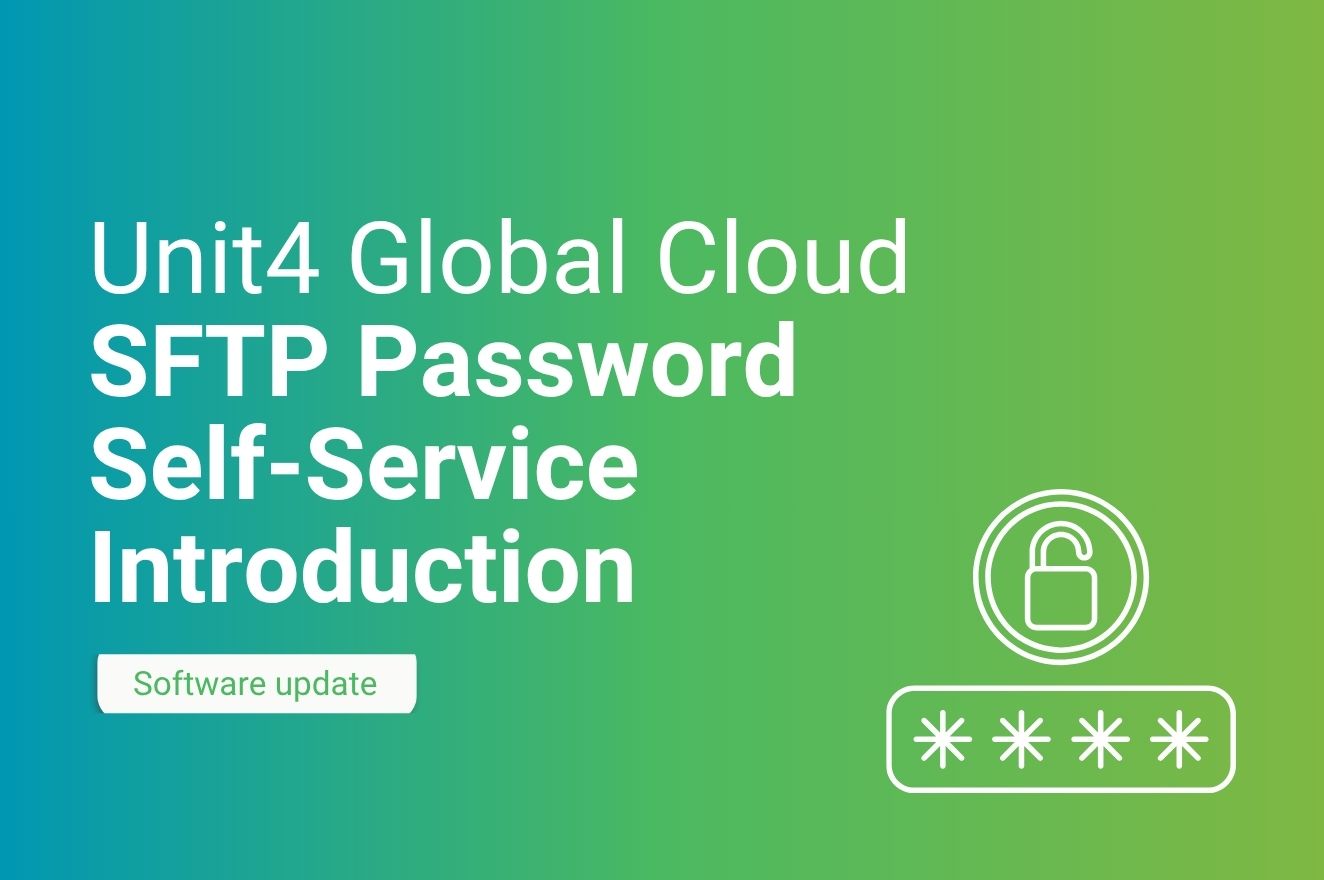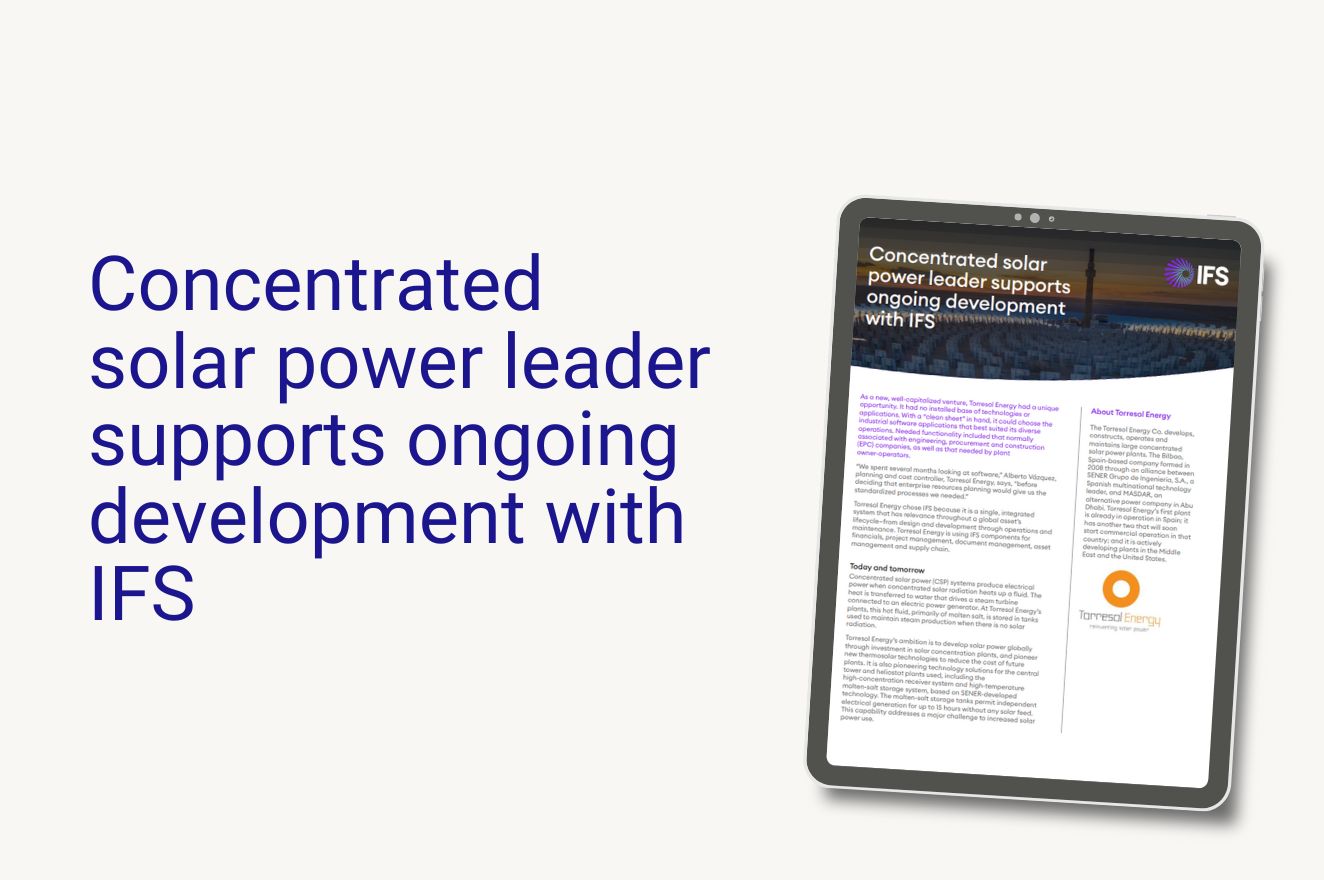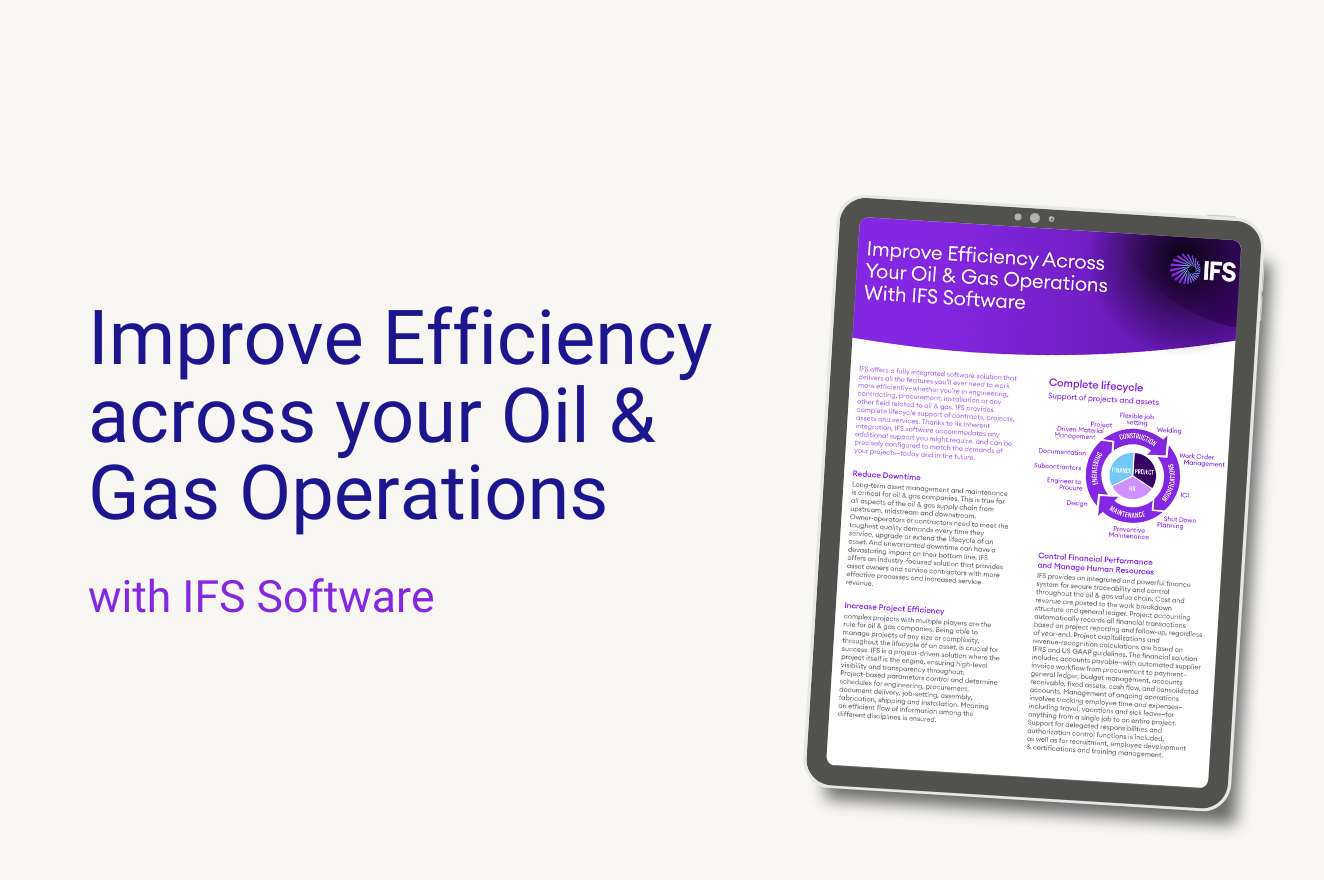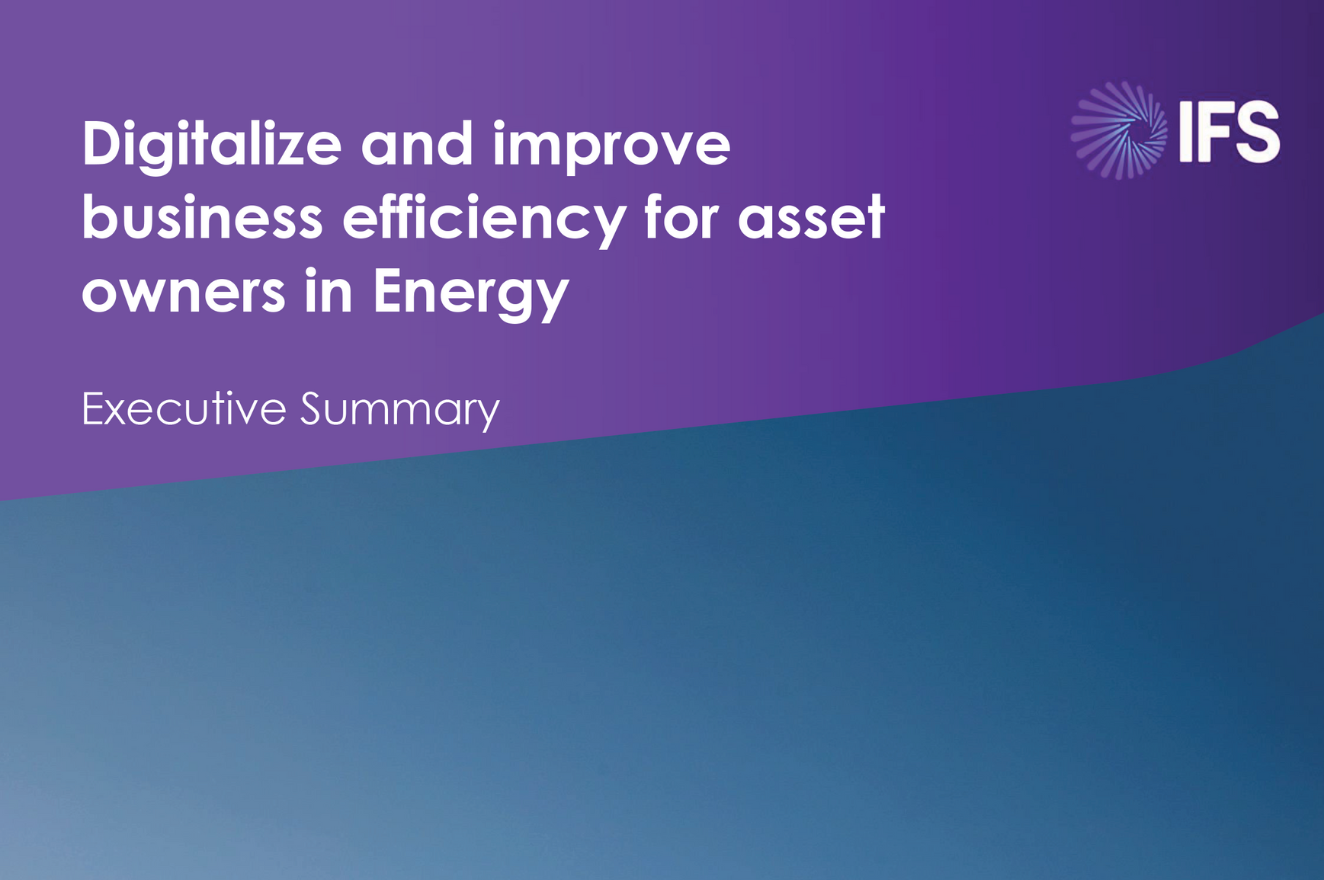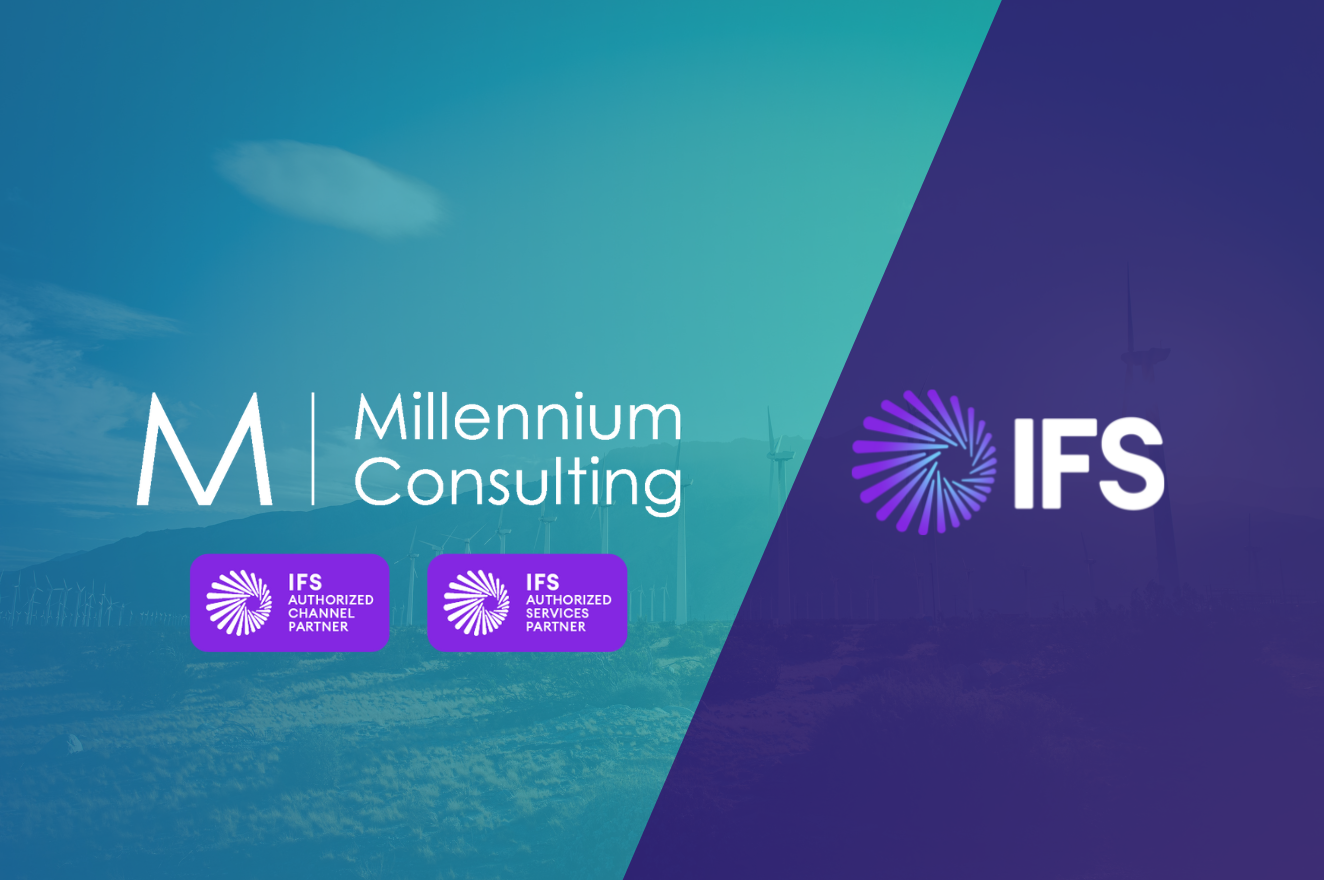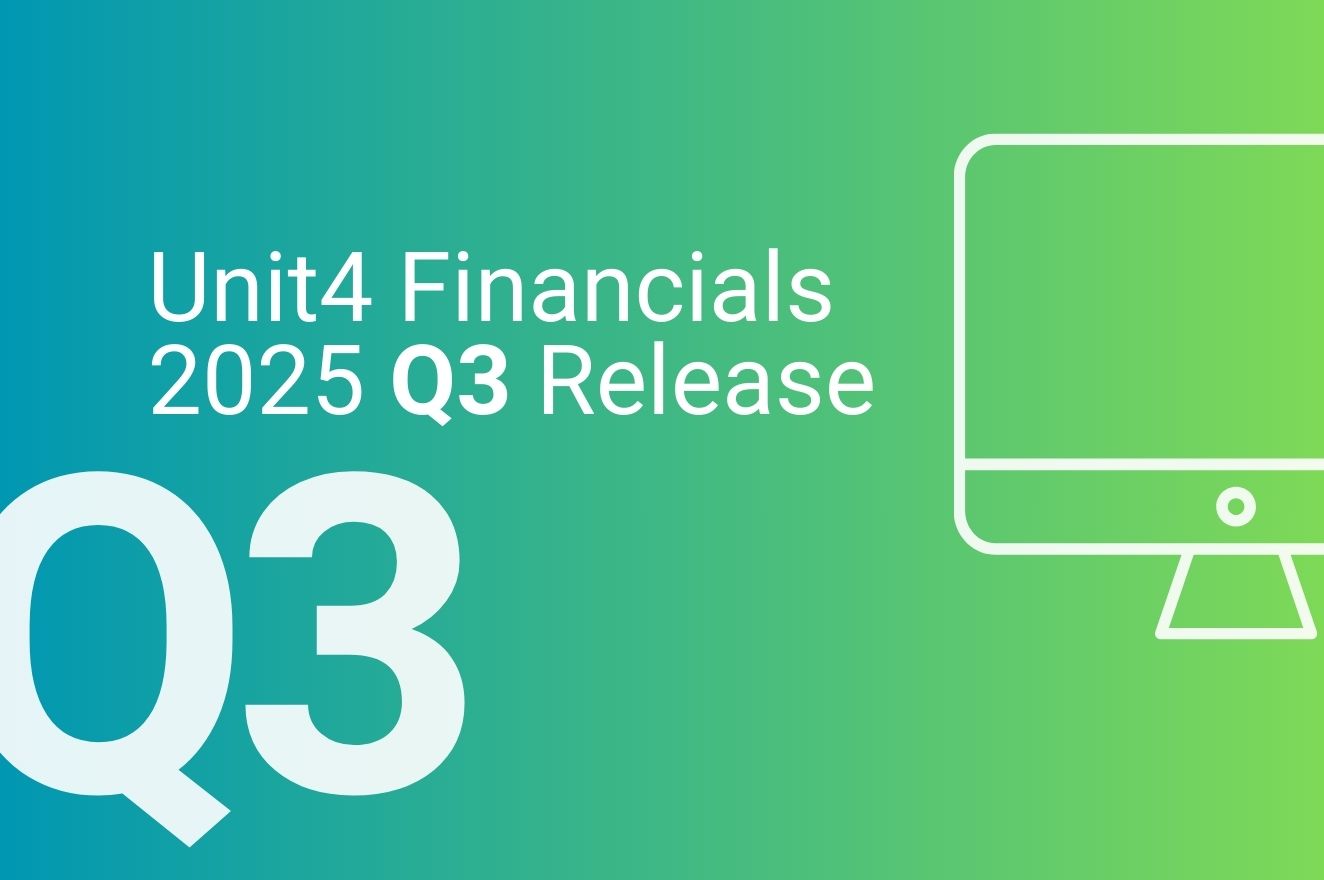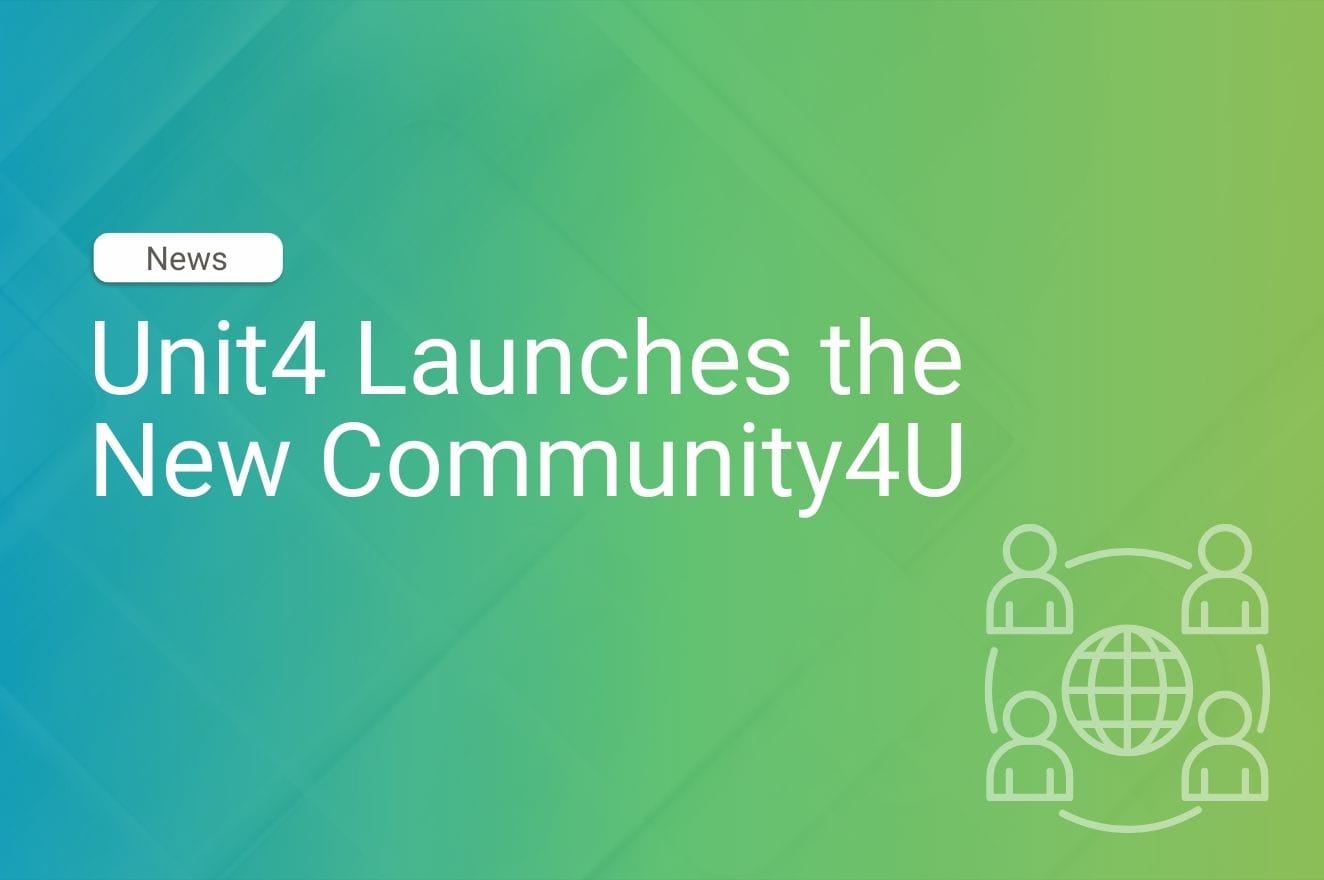3 ways to drive operational performance in renewable energy
Infographic
3 ways to drive operational performance in renewable energy
Explore this IFS infographic for three proven ways to improve operational performance in renewable energy and address common challenges.
Unit4 Global Cloud - SFTP Password Self‑Service Introduction
Software update
Published October 2025
Unit4 is introducing a new SFTP Password Self-Service Portal to give you more control and improve security. You can now manage your own SFTP password at any time, without needing to contact support.
Your current SFTP password has not been changed – you can continue using it until you decide to update it via the portal. As part of this change, we will remove all existing SFTP passwords from our database and will no longer retain any password details.
Full details, including User Guidance, are available on Community4U.
If you have any questions, please do not hesitate to contact Unit4 Customer Support..*open link in new tab please*
Why choose Millennium for Unit4?
As an Elite Unit4 Partner with over three decades of experience in Change Management, we bring expertise in designing, implementing, and supporting the right Unit4 solution for your business. Unlock the full potential of your Unit4 solution by partnering with Millennium – your trusted transformation partner.
Torresol Energy
Case Study
Concentrated solar power leader supports ongoing development with IFS
As a new, well-capitalized venture, Torresol Energy had a unique opportunity. It had no installed base of technologies or applications. With a “clean sheet” in hand, it could choose the industrial software applications that best suited its diverse operations. Required functionality included that normally associated with engineering, procurement and construction (EPC) companies, as well as that needed by plant owner-operators. Torresol Energy chose IFS Applications because it is a single, integrated system that has relevance throughout a global asset’s lifecycle—from design and development through operations and maintenance. Torresol Energy is using IFS Applications components for financials, project management, document management, asset management and supply chain.
EDF Renewables UK chooses IFS Cloud to power ambitious growth plans
EDF Renewables UK chooses IFS Cloud to power ambitious growth plans
London, UK, March 3, 2022 – IFS, the global cloud enterprise software company, today announced that EDF Renewables UK and Ireland, the leading renewable energy company, has chosen the IFS Cloud™ platform to deliver Enterprise Asset Management (EAM) to support their ambitious growth plans.
EDF Renewables UK and Ireland is a joint venture between EDF Renewables Group (EDF’s global renewable business) and EDF Energy (EDF’s UK generation business) and specialises in wind, solar and battery technology. To support their plans to increase total green energy output produced by their onshore and offshore operations, EDF Renewables UK launched the project in 2021.
During the engagement with IFS, the teams on both sides developed mutual trust and a joint vision of the optimal way to achieve the project’s goals and objectives. EDF Renewables UK and Ireland chose IFS Cloud due to its clear operational and commercial advantages. IFS provides a future-proof solution built around a concept of composable enterprise, which gives EDF Renewables UK and Ireland the operational flexibility and business agility that is critical for innovative businesses with a high growth rate.
IFS will power the company’s Enterprise Asset Management, including Operation & Maintenance, Work Order Management, Contract Management and Mobile Workforce Management – a key aspect for the energy company that puts their employees at the heart of their business. As IFS Cloud is a single platform with a single data model supported by key value drivers such as Asset Performance Management, Internet of Things (IoT), mobile work execution and live dashboards and KPIs, the company will be able to provide end-to-end visibility across multiple organisational structures and business units. IFS Cloud will be deployed to 380 full users, with 90 mobile technicians.
“We are proud to be able to power EDF Renewables UK and Ireland in supporting a vision for the growth of clean energy,” says Alan Laing, Managing Director UK&I, at IFS. “IFS Cloud was designed to offer companies with a high growth rate an uncomplicated path towards becoming more data-driven, improve innovation, and, ultimately, deliver a better Moment of Service™ to their customers. We couldn’t be more excited to partner with EDF Renewables UK and Ireland on this mission.”
Piero Maggio, Director of Asset Operations EDF Renewables UK & Ireland, also expressed his excitement to be partnering with IFS.
“Delivering IFS Cloud forms a key part of our future growth strategy. The new platform will allow us to scale our business more efficiently and consistently, whilst also capturing the richer management information needed to drive continuous improvement and inform key decision-making. Using IFS Cloud will enable us to optimise the quality and utilisation of our assets, as well as create shareholder value through improved information flows. I couldn’t be more pleased to be working with IFS.”
About IFS
IFS develops and delivers cloud enterprise software for companies around the world who manufacture and distribute goods, build and maintain assets, and manage service-focused operations. Within our single platform, our industry specific products are innately connected to a single data model and use embedded digital innovation so that our customers can be their best when it really matters to their customers—at the Moment of Service™. The industry expertise of our people and of our growing ecosystem, together with a commitment to deliver value at every single step, has made IFS a recognized leader and the most recommended supplier in our sector. Our team of 4,500 employees every day live our values of agility, trustworthiness and collaboration in how we support our 10,000+ customers.
Discover more
As a premier IFS Managed Service Provider, Millennium Consulting is ideally placed to support companies across the renewables sector. Please get in touch to discover what’s possible.
IFS enterprise software: the ideal choice for Renewable Energy companies

The renewable energy industry continues growing at an unprecedented pace, with companies facing ever greater demand to deliver sustainable solutions whilst at the same time generate profit.
From wind and solar to hydropower and emerging clean technologies, businesses in this sector have to navigate complex regulatory environments, manage large portfolios of assets and ensure optimal service delivery.
Selecting an enterprise software platform that can support the wide ranging needs of renewable energy companies is a challenge however IFS software is a good choice for many reasons.
Renewable energy companies typically operate large numbers of physical assets such as solar farms, wind turbines, hydro plants and storage facilities. IFS provides powerful Enterprise Asset Management (EAM) tools that enable organisations to monitor equipment health, schedule predictive maintenance and maximise asset lifespan. A reduction in downtime and performance optimisation enables renewable energy companies to achieve higher energy output and ROI.
Renewable energy projects require significant capital investment, with multiple stakeholders and strict timelines. IFS Project Management tools can provide end-to-end visibility, from planning and resource allocation through to execution and reporting which enable renewable firms to deliver projects on time and within budget, while meeting sustainability goals.
Wind and solar farms often operate in remote difficult-to-access locations and IFS Field Service Management (FSM) ensures that maintenance crews are efficiently dispatched with the right skills, tools and necessary spare parts. Features such as mobile access and real-time data sharing improve first-time fix rates, reducing cost and enhancing safety.
Renewable energy companies rely on data from IoT sensors, SCADA systems and environmental monitoring tools and IFS integrates seamlessly with these data sources, offering advanced analytics and reporting capabilities. Decision-makers can obtain actionable insights into performance, sustainability metrics and financial health which empowers better strategic decision making.
IFS software is designed to comply with industry regulations, health and safety standards and environmental reporting requirements. By centralising compliance processes, renewable companies can reduce risk while demonstrating transparency and commitment to sustainability.
As renewable energy companies expand into new regions and technologies, they need systems that can scale with them. IFS’s flexible, cloud-enabled architecture supports global operations, multiple business models and evolving regulatory landscapes. This future-proof approach ensures companies remain agile in a rapidly changing industry.
In summary, IFS software is the go-to platform for renewable energy organisations as it can empower renewable energy companies to manage assets, optimise service delivery, streamline projects and ensure compliance while supporting growth and sustainability. With a proven track record across energy and utilities, IFS stands out as a powerful enabler of organisations driving the transition from fossil fuels to clean energy.
For further information about the benefits IFS software can provide renewable energy companies speak to the Millennium Energy team.
Published September 2025
Unit4 Financials 2025 Q3 Release
Unit4 Financials by Coda 2025Q3 was made available on 9 September 2025.
Highlights of the 2025Q3 release include:
Administration:
Message Transport Implementation
Unit4 SaaS customers are now able to integrate with Unit4 Mail Server by using the Unit4 Mail Server User Extension.
Finance:
Company Master
Balancing Elements can now be specified for a company identifier on the Company master for use in Electronic Invoicing.
Intray Management
Intray Management now limits the rows returned. The limit is applied to both ‘Intray Management – Select’ result and ‘Explode Document’.
Pay/Collect Print
The user can now select a Printing Options Master as a runtime parameter on the print screen within Pay/Collect for Remittance output.
The file name on the Printing Options Master can be static or it can be created from the list of vocabularies available on the Print Format dataview.
Structured Output:
IV3
A new transformation type, called ‘IV3 Transformation’ is available. This will output an IV3 report in JSON format.
This is a requirement for public sector customers in the Netherlands, who will need to submit their IV3 report to the Dutch Statistical Office (CBS) in JSON format.
Fixed Text
A new transformation type is available, called ‘Fixed Text Transformation’, this will output data in a fixed text format.
Electronic Invoicing:
Posting to Companies with Balancing Elements
For companies using balancing element, the account codes for electronic invoices and credit notes use the balancing element or elements from the company master Electronic Invoicing Company Identifiers list.
Technical:
Deprecated features:
The .NET router has been deprecated. The final release has not been determined.
The Integration Toolkit Command Centre module (ITK) has been deprecated and will be removed in a future release. The final release has not been determined.
The ability to implement User Extensions using JavaScript is deprecated. The final release to include this support has not been determined.
Note: Support for implementing User Extensions using Java is not deprecated and is the recommended approach for implementing User Extensions.
The command line utility coda-encrypter.exe is deprecated. The final release to include this support has not been determined.
Removed features:
32-bit XL was removed in the 2025Q1 release. Please use the 64-bit XL. This means that the supported releases of XL are available as 64-bit only.
Support for Apple Safari has ended. It is recommended to use Google Chrome or Microsoft Edge.
Security Updates
- Automated assistance in filling out form field values (autocomplete) is now disabled by default.
- The configuration setting com.coda.esi.core.autocomplete can be used to enable it.
- Management of user passwords on the Message Transport master has been improved.
- The third-party libraries poi and poi-ooxml have been updated to improve security. This addresses CVE-2025-31672.
- Third party library launch4j has been updated to version 3.50 this allows Command Line Utilities provided as windows executables to find the version of Java using PATH as the primary search.
General Fixes/Updates:
- A more informative error message is now returned to the user, when updating flexi-field master tables which are replicated. The error message now informs the user that they do not have permissions to update the table because it is replicated, and they should contact their system administrator.
- Flexi-field data is no longer removed when the exchange rate is modified on documents posted to the Intray.
- The correct selection criteria are now used when printing customer statements via a scheduled task.
- The CSV transformation in Structured Output no longer reports an error when no data is returned, the process now completes successfully. The log confirms 0 rows written and extracted.
- Application header text now treats all characters as ‘text’ to prevent unexpected behaviour.
- The finance/elementmaster/elementfinder REST API Endpoint no longer returns a SERVICE_UNAVAILABLE error.
- The finance/elementmaster/trader REST API Endpoint no longer returns a SERVICE_UNAVAILABLE error
Further details on the new features, security updates and reported issues can be found in the release documentation.
The release documentation for this release (and previous releases) can be found in the documentation area on the community.
The software can be downloaded from the “Software” tab on Community4U.
Are you making the most of Unit4 Financials by Coda?
Our Systems Health Check is designed to help you identify areas where you may be able to improve performance and ensure you extract the maximum benefit from your investment in Unit4 Financials by Coda.
Unit4 Launches the New Community4U
Unit4 Launches the New Community4U
As a Unit4 Elite Partner, we’re excited to share that Unit4 has officially launched its new and improved Community4U platform – the go-to space for customers and partners to connect, learn, and shape the future of Unit4 solutions.
What’s New?
- Success4U Hub
A focused hub for you and your peers to learn, discuss, explore our catalog of services, and drive success outcomes together.
- A Refreshed Look & Feel
A new UI brings a cleaner, more modern experience—optimised for clarity, ease of use, and accessibility.
- Streamlined Navigation
Our redesigned menu makes it faster and more intuitive to find what you're looking for—less clicking, more doing!
- Follow Your Favourite Experts
You can now follow other users, track updates, insights, and expertise from the voices you trust within Community4U.
- Events for Everyone
Soon, you can expect a centralised events section open to all users, so you never miss learning or networking opportunities across all Unit4 solutions. Until then, you can check all our previous webinars and events.
Why It Matters
Community4U brings together thousands of Unit4 customers and partners globally. It’s where you can:
- Share ideas for product enhancements (many have already shaped recent updates)
- Get quick answers and tips from peers
- Stay informed on best practices and Unit4 news
Get Involved
If you’re a Unit4 customer, this is the perfect time to explore the new platform, reintroduce yourself to the community, and see what’s changed.
If you have any questions or experience issues with logging in, please reach out to Unit4 at community4u@unit4.com or submit a request in Support4U.
Published August 2025
Why choose Millennium for Unit4 Financials by Coda?
We are an Elite Unit4 Partner with more than three decades of experience working with Unit4 Financials by Coda. That means we have the knowledge and experience to design, implement and support the right Unit4 Financials solution for your business.
Unit4 Financials by Coda 2024Q4 compatibility with older XL for Finance versions
Following the release of Unit4 Financials by Coda 2024Q4 to the Unit4 Saas Production environments over the weekend of 25th/26th January 2025 we have received reports from users of XL for Finance add in regarding connection / licence issues.
We believe this is related to the usage of older XL for Finance add in software. A change was made in 2022Q2 XL for Finance add in to add a newer security algorithm. The main software release 2024Q4 deployed this weekend has removed the support for the older algorithm completely.
If you receive a message “unable to allocate a license” as part of making XL for Finance connections, please check your XL for Finance release version and where appropriate update to the latest version. Please check the platform matrix to ensure your Microsoft Excel version is compatible with the latest U4FbC XL for Finance add-in.
Customers with XL add in 2022Q2 or later are not affected by this notice / change.
If you are affected or need support, please don’t hesitate to contact us directly – we’re here to help.
Published July 2025
Why choose us?
We are an Elite Unit4 Partner
We provide solutions, services, and support across the extensive Unit4 product suite and are experts in delivering transformation.
IFS Cloud Reaches New Heights with Microsoft
IFS Cloud Reaches New Heights with Microsoft
IFS Cloud has achieved both the Azure Software Designation and Microsoft Industry AI Certifications across all 11 industries—believed to be the first Microsoft partner to reach this milestone.
This achievement enhances IFS’s presence on the Microsoft Marketplace, reinforces trust in its IFS.ai capabilities, and enables closer alignment with Microsoft across go-to-market strategies, co-sell initiatives, and industry-specific innovation.
A significant advancement—driven by collaboration, technical excellence, and a shared commitment to innovation.
To explore how IFS solutions can support your business, please contact Millennium Consulting for more information or to discuss your requirements.
Published July 2025
Product Announcement for Customers using the REST API and Unit4 Financials by Coda Continuous Release 2025Q1
Product Announcement for Customers using the REST API and Unit4 Financials by Coda Continuous Release 2025Q1
This message is only for customers using the REST API
We would like to share information regarding a potential issue with the backward compatibility of the REST API changes made in the 2025Q1 release.
The following service requests were changed and are now at version 251.
Finance
- Company
- ElementMaster
Procurement
- POPCallOff
- POPGoodsReceivedNote
- POPInput
- POPPurchaseOrder
- POPRequisition
Electronic Invoicing
- FailedSubmission
REST API calls identifying as v244 made to the above Finance services will return a response based on v251 and as such can include some additional vocabulary items in the JSON.
The nature of the changes in the Procurement and Electronic Invoicing REST API services do not look to create the same situation, you may wish to validate this yourself though.
Any issues encountered can be resolved by updating the expected response information to version 251.
Further information can be found in Knowledge Article KB0043006. available within Support4U.
The SOAP webservices and XMLi are unaffected and maintain full backwards compatibility.
The issue will be resolved in Unit4 Financials by Coda Continuous Release 2025Q2.
Unit4 apologise for any inconvenience this issue may cause.
Millennium Consulting are aware of the issue. If you are affected or need support, please don’t hesitate to contact us directly – we’re here to help.
Published July 2025
Why choose us?
We are an Elite Unit4 Partner
We provide solutions, services, and support across the extensive Unit4 product suite and are experts in delivering transformation.



